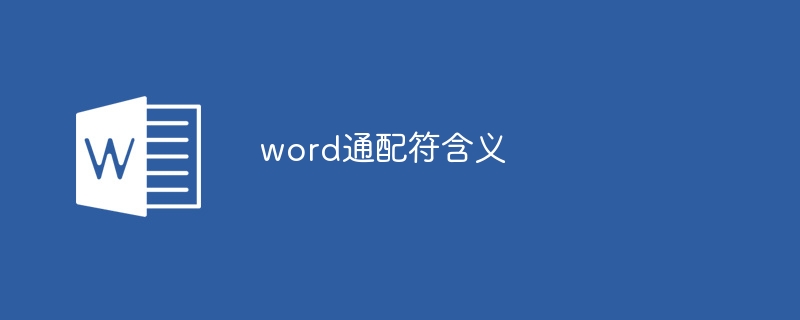word wildcard meaning
There are three commonly used wildcard characters in Word: asterisk (*) represents any number of characters, question mark (?) represents any character, and square brackets ([ ]) represents any one of the characters listed in the square brackets. character.

The meaning of wildcard characters in Word
Q: What are the wildcard characters in Word and what do they represent?
Answer: There are three commonly used wildcard characters in Word:
- ## Asterisk (): represents Any number of any characters. For example, "ab" can match strings such as "ab", "abc", "abcd", etc.
- Question mark (?): represents any character. For example, "?est" can match the strings "test", "best", "pest", etc.
- Square brackets ([ ]): represents any character in the character set listed within the square brackets. For example, "[aeiou]" matches "a", "e", "i", "o", or "u".
Detailed explanation:
Asterisk (*)
- Matches a string of any length , including the empty string.
- is used to search for words or phrases that start or end with a specific string.
Question mark (?)
- Matches a single character.
- is used to search for words or phrases containing specific characters.
Square brackets ([ ])
- Matches any character in the character set specified within the square brackets.
- Used to search for words or phrases that contain a specific range or set of characters.
Example:
- "Contract*": Matches all words starting with "contract", such as "contract" ", "contract", "contractor", etc.
- "*本?体": Matches all words that contain the word "本" and end with a "体", such as "Ontology", "Text", etc.
- "1-90-9": Matches all four digits, such as "1234", "5678", etc.
The above is the detailed content of word wildcard meaning. For more information, please follow other related articles on the PHP Chinese website!

Hot AI Tools

Undresser.AI Undress
AI-powered app for creating realistic nude photos

AI Clothes Remover
Online AI tool for removing clothes from photos.

Undress AI Tool
Undress images for free

Clothoff.io
AI clothes remover

Video Face Swap
Swap faces in any video effortlessly with our completely free AI face swap tool!

Hot Article

Hot Tools

Notepad++7.3.1
Easy-to-use and free code editor

SublimeText3 Chinese version
Chinese version, very easy to use

Zend Studio 13.0.1
Powerful PHP integrated development environment

Dreamweaver CS6
Visual web development tools

SublimeText3 Mac version
God-level code editing software (SublimeText3)





